As anyone familiar with Shakespeare should know, his early comedy, The Taming of the Shrew, is about two Paduan sisters. The younger one, Bianca, is sweet, demure and charming at least on the surface. The elder, Katharina, is shrewish, angry and violent (also on the surface?) Naturally, men are lining up to marry Bianca, but the girls’ wealthy father, Baptista Minola, either wants to keep Bianca to himself, feels sorry for Katharina or is just desperate to get her out of his house because he’s declared that the younger shall not marry before the elder. Bianca’s suitors are reduced to zany schemes to woo her behind her father’s back. Finally, a husband for Katharina comes along: Petruchio, who loves a challenge, seeks to marry into money and won’t take no for an answer.
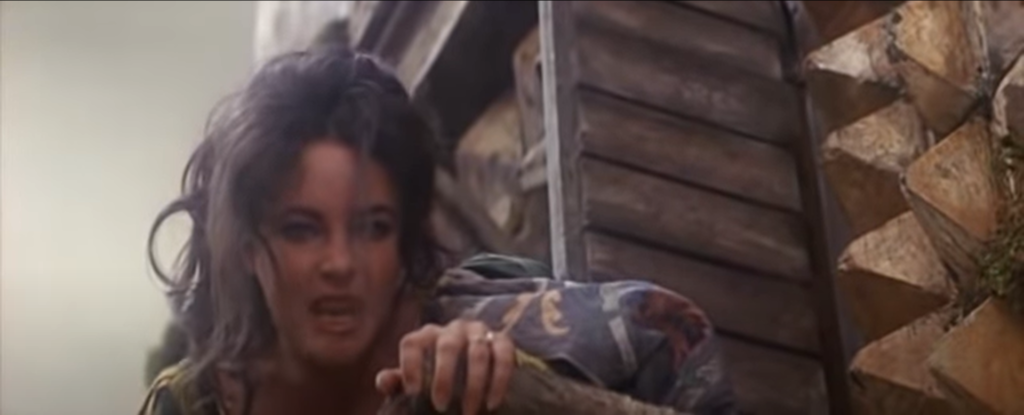
In the average Shakespearean comedy, if there’s a battle of the sexes, the leading lady runs circles around the man.[1]cf. Love’s Labour’s Lost, All’s Well That Ends Well and The Merry Wives of Windsor. The battle arguably ends in a stalemate in Much Ado About Nothing. Shakespeare often had the heroine of his romantic comedy be the character most in control of her situation[2]cf. The Merchant of Venice or As You Like It. or at least have the widest understanding of what’s going on around her.[3]cf. Twelfth Night. For once, however, the male is victorious in The Taming of the Shrew and it ends, more or less, with the heroine declaring that it’s hopeless and unnatural for women to try to master men and they should just make the best of things. There’s reason to believe some found this play misogynistic even back in the day[4]John Fletcher wrote a deconstruction of it called The Woman’s Prize or The Tamer Tamed. and even modern people who agree with the idea of wifely submission will look askance on some of Petruchio’s motives and methods. The idea that kindness and gentleness are the best ways to win over a woman is pretty thoroughly debunked by the Shrew. Even betting on your wife, as the husbands do in the last scene, is frowned upon now. Yet The Taming of the Shrew hasn’t been relegated to the same dustbin as such offensive Shakespeare plays as The Two Gentlemen of Verona or All’s Well That Ends Well, which are seldom performed now or if they are, it’s by professional Shakespeare companies with the resigned air of “it’s Shakespeare so it must be good for you.” People still keep putting on productions of this play, still keep paying to see it, still keep trying to find a way to reinterpret it be socially acceptable.
Why? Well, this play has a dirty little secret.
It’s funny. Really funny. Hilarious even.
It also has to do with the tone and I’m not just talking about the fact that The Taming of the Shrew is a comedy and Shakespeare wasn’t recommending acting like Petruchio in real life.[5]Given his culture, what Shakespeare would have recommended might have been worse actually. While the story is ostensibly about Katharina having all the pugnacity drained out of her, her dialogue doesn’t make it sound like she’s losing her energy the more time she spends with Petruchio. If anything, it sounds like she’s exhilarated. Compare her generically shrewish lines in her first scenes with her battle of snappy insults with Petruchio on their meeting. In the later scenes of Petruchio blackmailing her into agreeing with him no matter what ridiculous thing he says, she doesn’t just mechanically repeat his absurd statements, a weary broken shell of a woman, but picks up and elaborates on his fantastical suggestions with some flair.[6]For a full analysis of Katharina’s character arc along these lines, read Alexander Leggatt’s excellent book, Shakespeare’s Comedy of Love. I’m not normally a fan of interpretations that posit all of a character’s clearly expressed opinions as lies on their part, but the idea that Katharina is attracted to Petruchio, on some level, from the start and that her protests are a subterfuge works so well in practice that I’m ready to declare it canon. Then again, I don’t think it’s good advice to stay in an abusive relationship for the thrills and many would object to the idea that if a woman initially rejects a man, it’s because she’s in denial. So maybe this play really is unsalvageable…
If you have an open mind about the material though, there’s a lot to love about director Franco Zeffirelli’s 1967 cinematic Taming of the Shrew[7]Keep in mind the person writing this has no experience with domestic abuse. If you or a loved one of yours has, your take may well be different., starting with the raucous local carnival during the opening credits that vividly establishes this isn’t going to be some lofty, philosophical Shakespeare movie. It’s going to be loud, boisterous and potentially rather offensive. The film brims with clever ideas for staging scenes in ways Shakespeare didn’t and in some cases couldn’t.
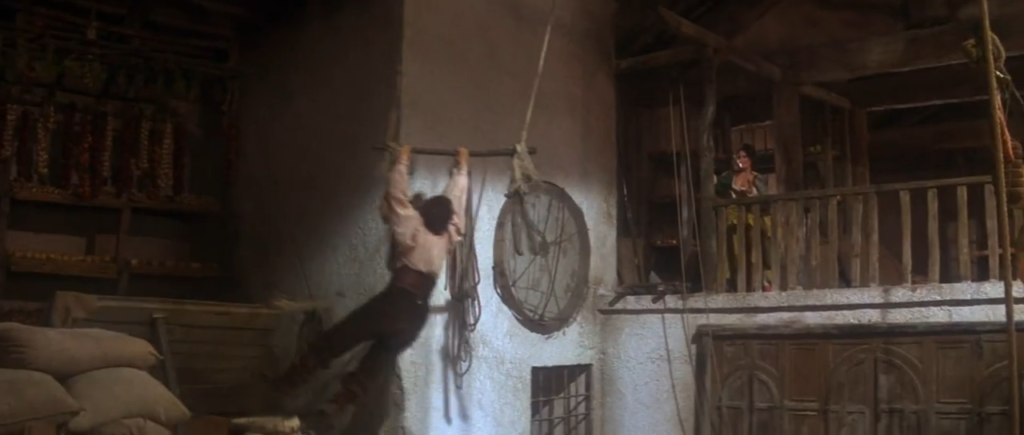
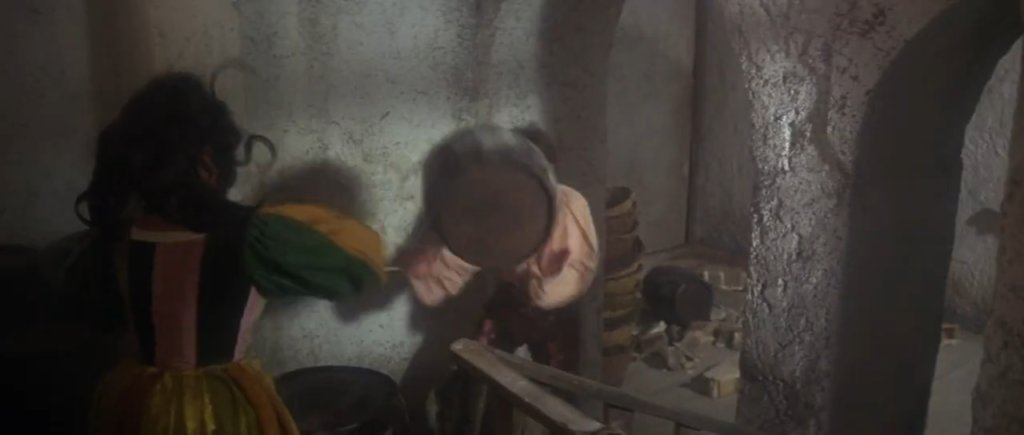
I love Bianca (Natasha Pyne)’s first sight of her love interest, Lucentio (Michael York), effectively tricking the viewer into thinking they rather than the less conventionally attractive Katharina (Elizabeth Taylor) and Petruchio (Richard Burton) will be the leads, and our first view of Katharina leaning out an upper story window and yelling like an anti-Juliet. The cast is all wonderful. I have to give special credit to Pyne, who despite having so many of her character’s lines from the play cut, manages to perfectly convey Bianca’s personality. And of course, there are Burton and Taylor’s crackling performances at the center.
Some critics have condemned the movie for focusing so much on elaborate slapstick set pieces and other forms of “lowbrow” comedy at the expense of sophisticated verbal wit. To this I can only reply…have those critics ever read the play at all?! It was never exactly meant to be highbrow. It’s admittedly true that the script by Zeffirelli, Suso Cecchi D’Amico and Paul Dehn plays a bit fast and loose with Shakespeare’s text. It cuts much of the original dialogue and even goes so far as to add a few original non-Shakespearean lines. The language is occasionally updated, gaining clarity for modern audiences while sadly losing a bit of depth.[8]For example, Katharina accuses her father of trying to make “a whore of (her) among (his) mates” rather than a stale, rendering her meaning clear but losing the pun on stalemate. Some of the cuts have unfortunate side effects. Lucentio’s second sidekick, Biondello (Roy Holder)[9]Tranio (Alfred Lynch) is his first sidekick, lacks a proper character introduction and one of Bianca’s hapless suitors, Hortensio (Victor Spinetti), transferring his affections to a wealthy widow (Bice Valori) comes completely out of nowhere. But in general, the movie’s reimagining of the play is brilliant and perfectly true to its original, anarchic spirit.
The most interesting, though not necessarily the most successful, way this film adapts the play is how it seeks to add depth to the main characters.[10]Some would say they always had this depth, but I think that since Shakespeare later became famous for the psychological depth and nuance of his character, people sometimes read it into his early … Continue reading In Petruchio’s first scene, Hortensio’s expressions of friendship for him, which in the play seem to have been genuine, are here a complete form. He’s clearly irritated by Petruchio’s boorishness and can’t wait to get him out of his hair. Only when Petruchio announces his desire for a wealthy wife and Hortensio sees a way to marry off Katharina, clearing the way to Bianca, does he become sincerely welcoming. Thus, both Petruchio and Katharina are portrayed as having no friends, making it (at least potentially) more satisfying when they find love in each other. The movie and Burton also suggest that Petruchio’s swagger may be just that and he’s not as secure in his shrew-taming abilities as he pretends to be. In his soliloquy in Act II Scene I, in which he plans his strategy for wooing Katharina, he comes across as genuinely nervous. In the final scene, where he makes a bet with the other new husbands as to which of their wives will come when called, he briefly appears worried that his will let him down. And when she gives her speech on what wives owe their husbands, which she does of her own initiative in this version, rather than exulting in his power over her, he appears deeply moved to the point of speechlessness.
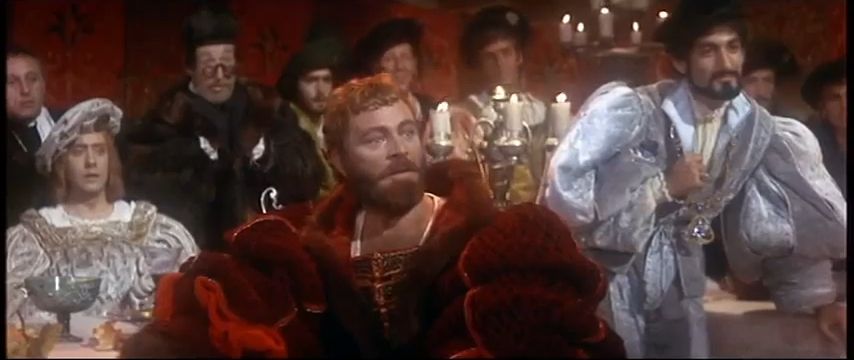
After her wedding, Zeffirelli starts to humanize Katharina too. (Arguably, so does Shakespeare.) Her humiliation at her wedding is too hilarious to be sad and even Petruchio dragging her off, kicking and screaming, to her honeymoon is entertaining in its sheer outrageousness, especially with Taylor’s invulnerable performance, daring anyone to pity her character. But between those two scenes, the movie creates a moment where Katharina sees her father give Petruchio his two thousand crowns for marrying her, and appears disappointed as if she’d hoped, despite her protests, to have found someone who really loved her.[11]In the Taming of the Shrew-inspired 1999 comedy, 10 Things I Hate About You, this would become a major plot point. When Katharina, forced to ride through the icy rain, falls into a puddle and holds out a hand for her husband to help her, only for him to laugh and ride off, she becomes a genuinely pathetic figure.[12]As the play describes this moment, Petruchio didn’t help her but he didn’t laugh at her either. Instead he pretended to blame his servant, Grumio (Cyril Cusack in the movie), for the … Continue reading After this, she takes on a more positive role, making over Petruchio’s dirty, messy house and befriending his shabby servants.[13]There’s some precedent for the latter in the play as the servants express sympathy for Katharina in Act IV Scene I (“By this reckoning he is more shrew than she.”) and she defends … Continue reading This humanization of the character is a double edge sword. On the one hand, it makes her less of a misogynistic stereotype.[14]To be fair, all of the characters in The Taming of the Shrew are stereotypes, male and female. On the other hand, the more we see her as a real person, the harder it is to laugh at her treatment at Petruchio’s hands and to see her contentedly married to him as a satisfying ending. Her refusal to submit to him threatens to come across less like childish stubbornness and more like heroic resistance.
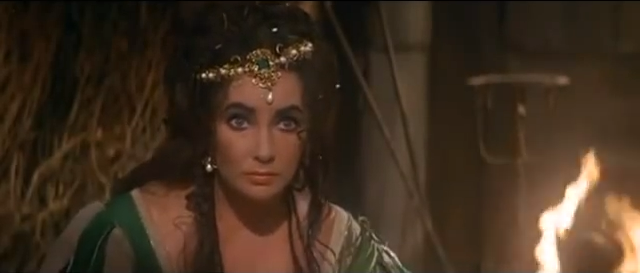
Much of Katharina’s character development in the movie’s second half is conveyed through wordless moments and facial expressions. It’s pretty hard to tell exactly what those indicate. This is the kind of movie that demands a director’s commentary and doesn’t have one. But when reading Shakespeare’s plays, I often feel like the characters have something go on in their heads that I don’t understand and wonder what motivates them to do what they do. In that sense, this movie may be one of the most accurate presentations of Shakespeare ever. When I try to analyze it, I’m not really sure that it works, but I keep returning to it and enjoying it just as I do the play, so apparently it does.
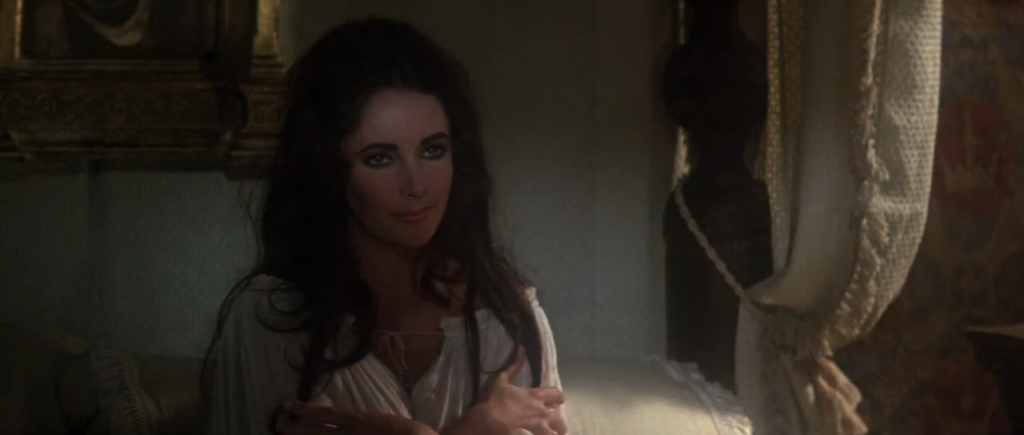
Some of this Taming of the Shrew‘s punches are pulled. Katharina explicitly isn’t forced to go along with the wedding by her father (Michael Horden.) Indeed, it’s hard to imagine this version of Baptista being able to force his daughters to do anything. And Petruchio’s most potentially disturbing method of controlling Katharina, denying her food until she acquiesces to him, is dropped.[15]Though careful productions can still make that part funny. Katharina actually ends up getting the better of Petruchio when he blackmails her into kissing him in public in the bit from Act V Scene I, which has the benefit of making their kiss in the next scene a bigger moment. But a significant punch isn’t pulled or is pulled in a subtle way. (I guess the punching metaphor breaks down here.) According to Hollywood legend, the filmmakers expected Elizabeth Taylor, who was hardly know for submitting to the men in her life, to give an ironic reading of Katharina’s climactic speech on proper wifely behavior. I don’t know what thespian instinct made her give the stern and serious reading she did, but whatever might be said against the speech from a moral perspective, she was quite right from a dramatic standpoint. If Katharina is obviously bitter and sarcastic at the end of the story, just as she was at the beginning, then her whole character arc becomes meaningless.[16]The idea that she’s putting on a show for others’ benefit in this scene is more workable and in keeping with the play’s motifs of trickery and disguise. But it amounts to Katharina … Continue reading Only if she comes across as sincere can the story work. Of course, the movie doesn’t quite end there. After delivering his final lines, Petruchio turns around to find that his wife has run off and he must chase after her yet again, implying perhaps that, in the words of John Muirden’s Shakespeare Well-Versed, “despite the play’s name/Kate will never be tame.”
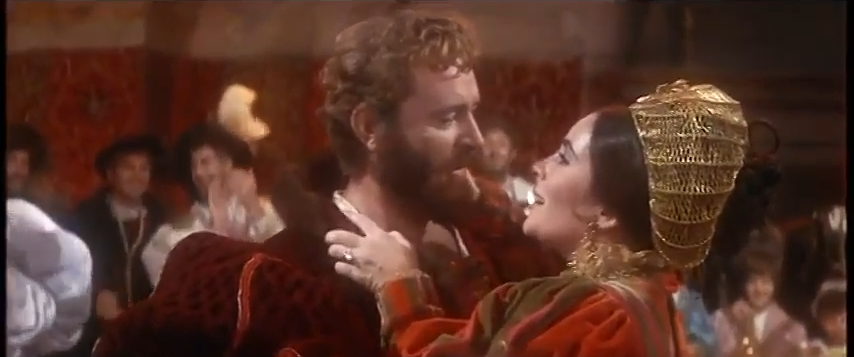
Bibliography
The Taming of the Shrew: Scene Index (shakespeare-navigators.com)
References
| ↑1 | cf. Love’s Labour’s Lost, All’s Well That Ends Well and The Merry Wives of Windsor. The battle arguably ends in a stalemate in Much Ado About Nothing. |
|---|---|
| ↑2 | cf. The Merchant of Venice or As You Like It. |
| ↑3 | cf. Twelfth Night. |
| ↑4 | John Fletcher wrote a deconstruction of it called The Woman’s Prize or The Tamer Tamed. |
| ↑5 | Given his culture, what Shakespeare would have recommended might have been worse actually. |
| ↑6 | For a full analysis of Katharina’s character arc along these lines, read Alexander Leggatt’s excellent book, Shakespeare’s Comedy of Love. |
| ↑7 | Keep in mind the person writing this has no experience with domestic abuse. If you or a loved one of yours has, your take may well be different. |
| ↑8 | For example, Katharina accuses her father of trying to make “a whore of (her) among (his) mates” rather than a stale, rendering her meaning clear but losing the pun on stalemate. |
| ↑9 | Tranio (Alfred Lynch) is his first sidekick |
| ↑10 | Some would say they always had this depth, but I think that since Shakespeare later became famous for the psychological depth and nuance of his character, people sometimes read it into his early plays, like The Comedy of Errors and The Taming of the Shrew, when it isn’t really there. |
| ↑11 | In the Taming of the Shrew-inspired 1999 comedy, 10 Things I Hate About You, this would become a major plot point. |
| ↑12 | As the play describes this moment, Petruchio didn’t help her but he didn’t laugh at her either. Instead he pretended to blame his servant, Grumio (Cyril Cusack in the movie), for the accident and beat him while Katharina waded through the mire, so it was a deliberate decision on this adaptation’s part to make Petruchio more of a jerk and the situation less funny. |
| ↑13 | There’s some precedent for the latter in the play as the servants express sympathy for Katharina in Act IV Scene I (“By this reckoning he is more shrew than she.”) and she defends them from her husband. Act IV Scene III, however, implies that they are complicit in Petruchio’s plan to starve her into submission. |
| ↑14 | To be fair, all of the characters in The Taming of the Shrew are stereotypes, male and female. |
| ↑15 | Though careful productions can still make that part funny. |
| ↑16 | The idea that she’s putting on a show for others’ benefit in this scene is more workable and in keeping with the play’s motifs of trickery and disguise. But it amounts to Katharina just being a more competent version of Bianca. Is that what we’re supposed to want? The worst solution is to try to present the play as a tragedy about Man’s inhumanity to Woman. The writing style Shakespeare employed in it simply isn’t flexible enough for that. |
